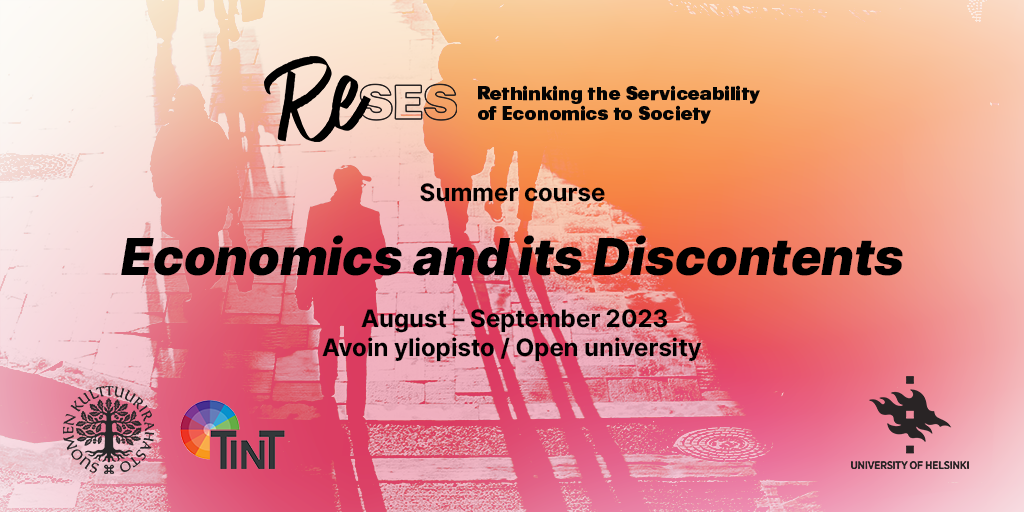
We are happy to tell that we are organising a summer course in August 2023 on the critical role economics plays in shaping our societies. Teachers of this interdisciplinary course will feature several members from our ReSES team. It is held online.
The lecturers are: N. Emrah Aydinonat, Hanna Ylöstalo, Markus Jäntti, Ville-Pekka Sorsa, Teemu Lari, Anita Välikangas, Magdalena Małecka, Timo Hämäläinen, Erkki Mervaala and Uskali Mäki.
The course is organised in August 2023, and available to Avoin yliopisto and University of Helsinki students for free.
Find out more & register to course
Welcome!
Course Calendar
Monday 7th August, 14-16
Introduction – Lecturer: N. Emrah Aydinonat
Wednesday 9th August, 14-16
Feminist Economics / Feminist Economic Policy – Lecturer: Hanna Ylöstalo
This lecture introduces insights from feminist economics and feminist political economy. It discusses the global economy, economics, and economic policies from feminist and gender perspective. It pays specific attention to care and social reproduction as the vital, yet unacknowledged, undervalued and often unpaid work that sustains life under capitalism. It also discusses economic policies from a feminist and gender perspective and shows how concurring social crises – economic crises, climate crisis, care crisis – can be traced back to the gendered structures of capitalist economy. The lecture brings a critical ‘gender lense’ to the economy, economics, and economic policies.
Monday 14th August, 14-16
Poverty & Inequality – Lecturer: Markus Jäntti
This lecture introduces the standard way in which statistics on income-based inequality and poverty are compiled for purposes of both research and official statistics. The lecture discusses the theoretical underpinnings of the standard approaches and explores a few main alternatives. The lecture further demonstrates a few standard sources for inequality and poverty statistics and discusses how such have been used as well as criticized in public policy discussions.
Wednesday 16th August, 14-16
Economics, policy advice and technoscientific capitalism – Lecturer: Ville-Pekka Sorsa
Social scientists engage with policy advice in various form and styles. Economics and economists have certain typical characteristics in the policy advice it informs and offers, respectively. However, economics also plays a more systemic role in the contemporary technoscientific form of capitalism. The performativity of economics is a key characteristic of various public and private institutions and organizations as well as policies and management. In my presentation, I will outline the key characteristics of economics as source of policy advice and the roles played by economists, and discuss the institutions performed with and arenas of decision-making systematically guided by knowledge derived from economics and/or economists.
Monday 21st August, 14-16
What is Pluralism and Does Economics Need It? – Lecturer: Teemu Lari
Pluralism” has become a buzzword among people critical of the current state of economics. According to a popular narrative, economists use an excessively limited range of theoretical and methodological approaches and consequently study the world from a dangerously limited perspective. According to the critics, economics should be fundamentally reformed in a way that would make the discipline more inclusive of a wide range of methods, approaches, and theories. Economics should include a plurality of perspectives, they say – hence, “pluralism”. According to some people, economics would provide more reliable knowledge if it was more pluralistic a discipline, while others argue that pluralism is good for reasons related to democracy or other ethical principles. This lecture aims to provide a critical and balanced review of the arguments used by the proponents of pluralism in economics. The lecture will help students to evaluate claims about economics being narrow and one-sided
Wednesday 23th August, 14-16
Economists in societies – Perspectives from Science and Technology Studies – Lecturer: Anita Välikangas
How does economics compare to other social sciences? What items characterise the professional community of economists? This lecture takes a look at economics profession, and the diversities within this profession in different national settings. I introduce the idea of boundary work, and use it for describing how academic communities aim at being legitimate and relevant. I also discuss the varieties within economics profession in different countries, and how academic practices, especially research evaluation, influence economics and its epistemic standards.
Monday 28th August, 14-16
Philosophical Perspectives on Modern Economics and the Computer – Lecturer: Magdalena Małecka
Modern economics is a powerful and controversial science. Economic frameworks feature in decisions of central banks, ministries and other organizations. Yet mainstream economics is criticized for failing to explain human behaviour and for being detached from empirical evidence. One of the attempts to overcome the criticisms is to make economics rely on recent advancements in machine learning, following earlier attempts by behavioural and experimental economists. This idea is enthusiastically welcomed by economists: more data seems to promise more empirically grounded economics.
There is an important fact missing in these debates and proposals for a reform of economic research: modern economics, both its theoretical and empirical part, has a long history of interactions with computer technology and AI research. During the lecture we will familiarize ourselves with this history and we will discuss epistemological implications of the transformation of economic research by the computer. This will allow us also to properly understand what is problematic about modern economics and whether the recent turn to AI and machine learning is a promising solution to its widely debated flaws’
Wednesday 30th August, 14-16
Economics and Complexity – Lecturer: Timo Hämäläinen
The world consists of complex systems such as the society, economy, nature, and human being. How can reductionist science, or a scientific discipline such as economics, help us to understand complex systems? How useful are its ceteris paribus assumptions, linear causalities, normal distributions, and equilibrium models in explaining the behavior highly interdependent, far from equilibrium systems with multiple feedback loops? Should efficiency maximization still be the dominant economic goal despite the fragility that it creates in the economy? These are some of the questions raised by the complexity perspective to economics. This lecture will focus on the limitations and contributions of economics in supporting our understanding of the increasingly complex world.
Thursday 31st August, 14-16
Conflicting framings of climate change and economic growth in public discourse – Lecturer: Erkki Mervaala
Economic growth and climate change, especially climate change mitigation, are often framed as opposing forces in the media. Despite recent review studies declaring the improbability of decoupling economic growth and greenhouse gas emissions and overuse of natural resources, in the media, climate policy is still framed as subservient to economic policy – of which the main goal is to pursue and maintain economic growth.
This juxtaposition is still prevalent in the Finnish media, seen even in the voting advice applications of the 2023 election season. Such complex and multifaceted issues require a nuanced understanding of the way they are talked about and what kinds of frames and articulations are used with regards to them. This lecture focuses on the contradicting representations of climate change and economic growth in Finland – both in mainstream media and politics.
Tuesday 5th September, 12-14
Homo economicus: variations of a queried persona – Lecturer: Uskali Mäki
Homo economicus is not a historical constant. It is a model that has evolved and keeps evolving. Nor is it a methodological constant. The idealizing assumptions that characterize it have served a variety of functions in modelling – in economics and some other disciplines influenced by economics. The lecture provides a story and diagnosis of this variation.


